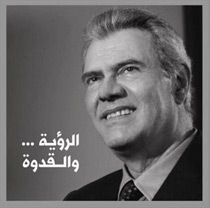Nassib Lahoud (1944 - 2012)
الخميس 2 شباط 2012
Nassib Lahoud was born in 1944 in Baabdate, Metn district, and was married to Abla Fustok with whom he had two children, Salim and Joumana. Lahoud completed his secondary education at College Notre Dame de Jamhour, and graduated from the High Institute of Engineering at Loughborough University, UK, in 1968 with a degree in electrical engineering.
Nassib Lahoud established Lahoud Engineering Co. Ltd. in 1972 which specializes in construction of industrial plants, and has built several power, seawater desalination and cement plants as well as oil installations in many parts of the Middle East, including the United Arab Emirates, Qatar and Bahrain. Lahoud Engineering became one of the leading Middle Eastern companies in its field.
In 1990, Nassib Lahoud was appointed as Lebanon’s Ambassador to the United States. In 1991, he was appointed Member of Parliament for the Metn district as the 1989 Taif Accord required that vacant parliamentary seats be filled until the elections were held following the end of the Lebanese civil war. Lahoud suspended the activities of his company in Lebanon, because he believed in separating his public role from private interests.
In 1992, Lahoud was elected as an MP for the Metn district in the first elections following the civil war. He was re-elected in 1996 and in 2000, during which he started setting up an opposition coalition and fought fierce political and electoral battles against repression, corruption and abuse of power, while the country was still under strong Syrian hegenomy. He defended the constitution, freedom and democratic values.
Lahoud headed the parliamentary Defense committee in 1991-1992, and was a member of the Foreign Affairs committee as well as the Public Finance and Budget committee from 1992 through 2005.
He opposed all amendments to Article 49 of the constitution which deals with the election of the President of the Republic, and was the only MP who voted against the amendments three consecutive times in 1995, 1998 and 2004. The amendment in 1995 extended the presidency of Elias Hrawi, and the 1998 and 2004 amendments allowed respectively, for the election of Army Commander General Emile Lahoud as president and for the extension of his term.
In April 2001, Lahoud launched with other politicians, civil society activists, academics, businessmen and members of professional syndicates the Democratic Renewal Movement (DRM), which has members from all walks of life and regions in Lebanon. The cross-sectarian movement aims at strengthening Lebanon’s sovereignty and independence, consolidating Lebanon’s role in the Arab world, defending freedoms, improving democracy in Lebanon, building an open modern economy, achieving social justice, and working towards inclusive citizenship. Lahoud was subsequently elected as president of the DRM.
In 2001, Lahoud also took part in establishing the Qornet Chehwan Gathering which was aimed at translating into politics the historic call in April 2000 of the Maronite Bishops Council, then headed by Patriarch Nasrallah Sfeir. He participated in all the activities of the Gathering and in articulating political stances on freedom, sovereignty and independence, rectifying Lebanese-Syrian relations, and launching dialogue with other political parties and factions. The Gathering formed the catalyst for what later became the Independence Intifada of 2005.
Since 2001, Lahoud played a prominent role in uniting the ranks of the parties and politicians who formed the opposition coalition, by organizing activities supporting public liberties and democracy, mainstreaming all advocacy actions, political opponents, students and youth groups. This occurred during the period of Syria tutelage over Lebanon when Syrian intelligence repressed freedom of expression and paralyzed parliamentary democracy.
In April 2004, Lahoud played an integral part in the launch of the Bristol Gathering, which brought together all opposition groups from various sects, ideologies and regions, and was one of the most prominent faces of the Independence Intifada and the Cedar Revolution, which arose after the assassination of former Prime Minister Rafik Hariri on February 14, 2005. The uprising’s historic demonstration on March 14, 2005 lent its name to the March 14 political grouping, of which Nassib Lahoud was a leading member until 2009.
On September 13, 2007, Nassib Lahoud officially announced his candidacy for the Lebanese presidency in a packed conference at the main conference center in downtown Beirut. His campaign platform, Vision for the Republic, outlined his plan for renewing Lebanon’s national pact, state institutions and democracy.
In July 2008, Lahoud was appointed as Minister of State in the national unity government formed after the Doha Agreement. His purpose in taking part in the government was to reconnect Lebanese citizens with the state.
He passed away in the early hours of February 2, 2011 after a long struggle with cancer.

